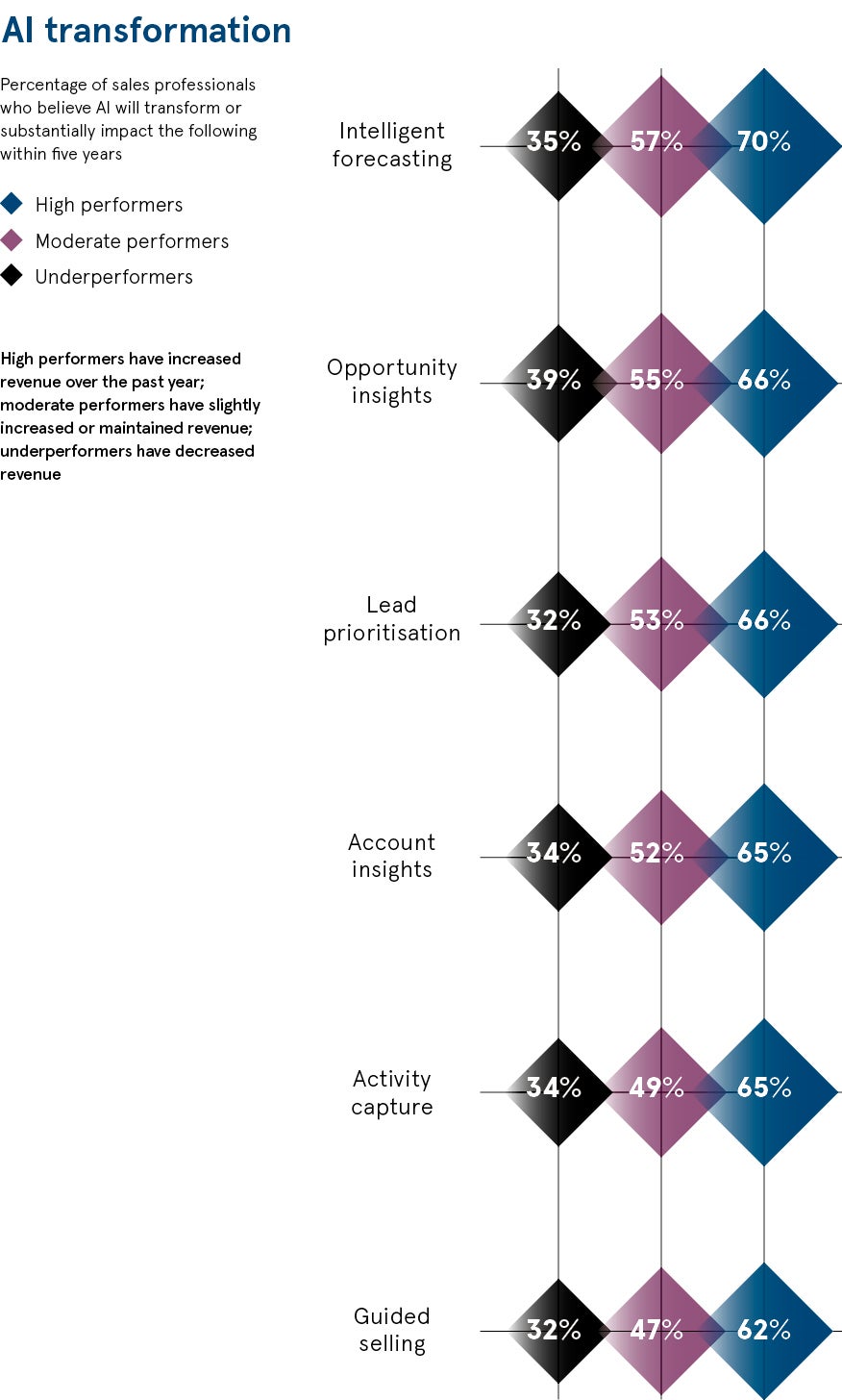Of all corporate functions, sales by its very nature is surely the most people-focused. While it may no longer involve quite as much face-to-face interaction as it once did, selling has remained emphatically a job for people rather than machines.
However, artificial intelligence (AI) and machine-learning are already starting to make major inroads into the sales process, adding an extra dimension to everything from marketing automation to customer relationship management. And they work. According to Salesforce Research, high-performing teams are at least twice as likely to be using intelligent sales technologies such as artificial intelligence, sentiment analysis, next-step analysis and deep-learning.
Tasks may be automatable, but customers still value the human touch
So, what further changes in the sales environment can we expect to see over the coming years?
According to analysts, between 45 and 85 per cent of sales tasks could be automatable - a startling thought. However, for anybody imaging a mass cull of sales departments, it is important to note that it’s the tasks that are automatable, not the jobs themselves; technology is assisting the staff, rather than replacing them.
And most experts agree that this is the way sales is going, with a recent McKinsey survey of business-to-business customers revealing that what most customers want is great digital interactions and the human touch.
“What we will see in the future, and what we see to some extent now, is the sales function reverting back to the human element,” says Dmitry Bagrov, managing director of global technology consultancy DataArt.
“My prediction is that we will see a lot fewer people doing product sales, as we see fewer people doing repetitive work in manufacturing, replaced by robots, and fewer people answering mundane questions in support, replaced by bots and AI. But we will see a lot more demand for people able to offer consulting and sales of services.”
How artificial intelligence can invigorate sales
According to the recent Salesforce State of Sales Report, only 21 per cent of sales leaders are currently using artificial intelligence. But with these sales leaders expecting AI adoption to grow by 155 per cent in the UK by 2020, sales functions are gradually adapting to make the most of the opportunities created by technology.
“Alongside creating efficiencies, AI can strengthen the sales pitch; thanks to the growing number of connected devices, customer data can be recorded and gathered from a range of sources,” says Salesforce area vice president Max Roberts.
“Real-time customer buying behaviour is at the fingertips of the salesperson, identifying trends to deliver actionable insights in context, such as when to follow up on a lead, recommending complementary products that may be of interest or qualifying pipeline to help teams focus their efforts, especially where large bids are involved.”
Early adopters of AI are seeing tangible benefits. Daiwa Securities, for example, is using SAS artificial intelligence recommendation support technology and says it has seen the customer purchase rate increase by 2.7 times as a result.
“These systems predict possible changes that individual customers may experience. Based on this, the technology can recommend the most suitable product offers for each customer or customer follow-up messages to engage and reduce churn,” says Peter Pugh-Jones, head of technology at SAS in Europe, the Middle East, Africa and Asia-Pacific.
“The advent of AI will definitely impact how sales representatives go about their work. For example, when faced with a customer query they will not be left processing large batches of information to pair the customer with the relevant product to suit their needs. Now, technology will facilitate this by deploying a list of relevant products and information for the representative to propose.”
Smart use of artificial intelligence will free up salespeople’s time
Companies using digital tools and advanced analytics, says McKinsey, are already pulling ahead of their peers, with 2.3 times the industry average revenue growth, 3 to 5 per cent additional return on sales and an 8 per cent higher total return to shareholders than the industry average.
Highly advanced, emotive AIs that act as ‘salespeople’ via AI holograms, and through augmented or virtual reality platforms, will not just be available, they will be expected
And many envisage AI-based sales tools becoming increasingly predictive, using behavioural analytics to understand patterns and predict user intent.
“Natural-language processing continues to develop, and advanced artificial intelligence technology is helping to anticipate, detect and react accordingly to emotional tells from each customer, all of which aids salespeople and importantly provides a better, more intuitive customer service,” says Shashi Nirale, senior vice president and general manager, Europe, Middle East and Africa, at customer experience management firm Servion.
“In just a few years, highly advanced, emotive AIs that act as ‘salespeople’ via AI holograms, and through augmented or virtual reality platforms, will not just be available, they will be expected.”
All this means is salespeople will increasingly be able to focus on what they do best, says Shane Finlay, chief value adviser at SAP.
“AI is already taking over automated, online sales processes, and it will be used to help salespeople dig deeper and learn more about their customers. If anything, great salespeople will become even more valuable to businesses. Salespeople aren’t selling widgets anymore, they’re selling services and services don’t end with a handshake,” he says.
“The salesperson of the future will need to build long-standing relationships with their customers and they’ll need to continually nurture and build new connections with those customers, and ensure products are maintained and customers are supported and valued.”
Tasks may be automatable, but customers still value the human touch

